MANAGEMENT • 4 MIN READ
The 2X Sales Blueprint
“What Are The Single Best Levers To Scale?”
I’ve asked myself this question more times than I can count.
And now after working with hundreds of 6/7-figure businesses across the globe — and helping private clients generate over $250M in revenue in the past couple of years — we know for a fact what these are.
One of them:
Your Sales Conversions.

But as with every part of your business, not only are we looking to have great results.
We are looking to make it CONSISTENT. Predictable. And not having to be done by you.
So, done right, you have world-class sales conversions and can crank up your marketing efforts. (And scale to incredible heights.)
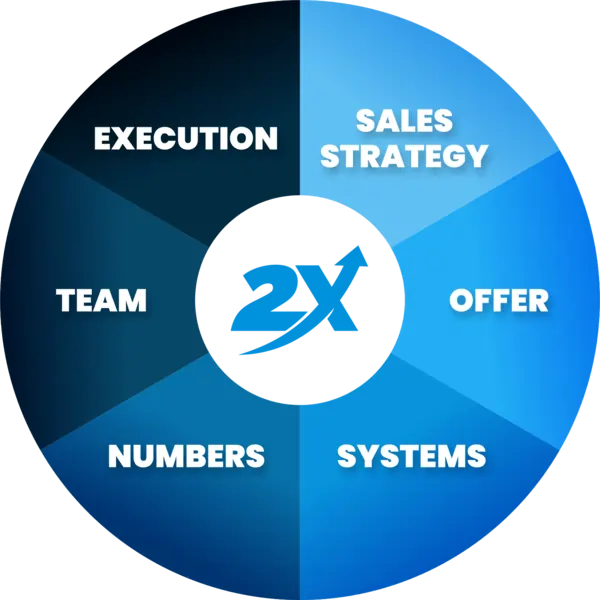
That is what this 2X Sales Blueprint is all about. Guiding you on the 80/20 of what matters most to make sales a major strength in your company.
Save this link, and let it be your guide to dramatically improve your sales conversions and consistency, and set you up for years to come.
Because the fact is:
The Company With The Most Effective Sales In Every Niche Will Be The Most Dominant.
Is that you?
If not — it’s about to be. IF you take action on what’s below.
Here’s what is covered in this full sales department guide:
- Your Sales Machine: and the key three pieces to drive consistent, scalable growth
- The Department Flow: the key pieces and prospect journey through your sales department; this is your high-level guide to build out.
- The ‘Secret Sauce’: to help you drive consistent, strong results (and stay free from working “in” your business)
- Your Sales Value Chain: the steps to optimize and identify your bottleneck
- The Sales Management Checklist: to make sales an ongoing strength
- Building An Elite Sales Team: the org chart and the key hidden role you need
- Mastering The Numbers: what matters and how to leverage them
- And Putting It All Together… with a high-performing, scalable sales machine!
Your Sales Machine
Everything that we preach and share at 2X comes back to one central point:
Everything in business that you want — the money and wealth, big growth, time freedom, impact — it all comes back to one thing:
Turning Your Business Into A Consistent Machine.
As soon as you do, you can achieve your wildest dreams as an entrepreneur.
So, what this includes is mastering three key elements: systems, numbers, and your team.
A ‘machine’ is when you have consistent, predictable, scalable, high-performing results without reliance on any one person. Systems, numbers, and your team will help make this happen.
We want this for your business overall… But the way we get there is by having each major department and function be a machine. In this case, sales.
You have a true sales machine when you have consistent, predictable, and scalable strong conversions without reliance on you — or any one person at all. This will put you in the top 1% in your niche in a hurry!
Below you’ll see the full breakdown of each piece to make this happen, starting with the high-level map…
THE FULL SALES DEPARTMENT FLOW
If you’re a high-ticket online business, here’s how your sales department will work.
But to start, let’s keep things simpler.
Here’s the core of this sales machine flow:
THE SALES VALUE CHAIN
The first step to turn your sales into a consistent, predictable machine is to map it out from a 30,000-foot level.
The way we do that is with what we call the ‘value chain’ — a lesson I learned from my first business mentor, who went on to become the CEO of a $6B pipeline company. We have taken this methodology into 2X helping entrepreneurs around the globe.
What we want to do is take your sales process, and map it out into individual steps. This way we can pinpoint where to focus and maximize the output.
Here are the four key phases of your sales cycle:

1 – The Pre-Call Warm-Up
A 2X principle is what we call ’80% Sold’. We want to get the prospects hot, ready, and going into the sales opportunity with momentum!
A strategic pre-call warm-up sequence and system will help make that happen, making it so much easier for sales to close them. (Even at a higher price and fast)
2X From 6 to 7 Figures Book
I break this process down in much more detail in my book, From 6 To 7 Figures. So check this out if you don’t have a copy already!
A few additional key elements of the pre-call system are:
- Confirming the appointment: a big issue most 6/7-figure businesses deal with is the show-up rate. This is frustrating for the team, and costly for your business if you don’t fix it. So confirm the appointment
- Prime them with more value: as our Head of Sales & Partnerships, Pat Bennett, always says, it all comes back to the value ratio. If you’re not closing, you’re not giving enough value. So we want to continue to give them value and get them super hot and engaged leading into the call.
- Objection squashing: the best time to handle an objection? Before it comes up! So strategically share in your pre-call sequence examples and benefits that put the major objections at ease.
Key Question:
Do you have a proven pre-call warm-up sequence that gets prospects hot and ready to be closed easily by the sales team?
2 – The Call
Now, it’s go time. This is when you get the opportunity to get the sale. (And start a long-term client relationship.)
The main system for this step and strong conversions:
Create And Follow A Proven Script.
This will have you being in flow and control. And over time, you’ll optimize the script to be proven to sell at a strong conversion rate. Don’t just wing it — create and follow a process.
You’ll make it easier, have better conversions, be more consistent, have a better prospect experience, be more efficient, AND have things be duplicatable so you can build a strong sales team. Plus, you can get free from sales and not be reliant on any one salesperson!
This is when you’re in the power position.
Other key elements of nailing the call are:
- Be prepared, not reactive: show up a few minutes early, have done your research, and be ready to start the conversation fast. Don’t rush things or force them; it is well worth the time to be prepared and in control from the start.
- Bring your A-game: this goes without stating, but it’s important to always remind yourself — and your sales team — of the value and potential of each and every call.
- Always a next step: never end a call without a next step. Even if it’s a no, there’s a clear next step. You have likely heard of BAMFAM: book a meeting from a meeting. This is a key thing to think about and live by, knowing 100% of the time you have a next step.
Key Question:
Are you confident that your sales call process is duplicatable and scalable beyond you or any one person? If not, start here!
3 – Immediate Post-Call
By now, you’ve had the call, given a ton of value, and hopefully are moving forward with a soon-to-be raving fan! But not every opportunity will be a sale.
Regardless, there needs to be a next step as mentioned above. And with that, there are a few things to note:
- Do what is promised: you can build trust in a hurry if you simply do what you say you’re going to do. It’s easy to promise the world. But set clear expectations, and then do them. Better yet, over-deliver.
- Do it fast: it’s pretty wild how, in a world of bad customer service and over-promise/under-deliver, how impactful good service is. One of the key things that can help is doing it fast. Your prospect/client will be thoroughly impressed, building more trust and validating what you shared on the sales call.
- Make it simple: in your follow-up, give them clear next steps and make it simple — to pay, or to get something. Your prospects are busy. You’re competing with a hundred other things they could do. So make it simple for them to take the action you want.
- Add a personal touch: yes, you’ll have your scripts and templates — but add a personal touch. Make sure you keep coming back to the biggest benefits (and pains) for them, and what the transformation looks like. A small personal touch goes a long way.
If you do all of these, you’re setting yourself up for great success in the future with that prospect/client.
It’s easy to talk a good game on a sales call. But right after is the time more than ever to show it!
Key Question:
Do you have the proven post-call processes to effectively and efficiently accelerate the relationship from the high of the sales call? Get these in place and watch your prospect/client satisfaction and future sales continue to scale!
4 – Follow Up
Sales is not a short-term game. It’s ideally a long-term relationship. Sometimes it takes months or even years to close a prospect. Sometimes you have a relationship with a client for years.
And as a result, the worst thing you can do is have your sales engagements be super short-term focused. The fortune is in the follow-up — for prospects AND clients.
Do you have regular check-ins planned? Do you have the tracking of them? Do you have a CRM where you keep notes so you can have relevant interactions every time and not forget the key details?

Key Question:
Do you have the ongoing follow-up systems in place to regularly check-in, support, and accelerate all qualified prospects and customers? If not, add this in and you’ll see a noticeable improvement within a period of weeks!
THE SECRET
Now, you may be thinking, this is a lot! How am I going to do this?
The thing is: you’re likely already doing a lot of the work! We just have to piece by piece start to turn it into a machine.
And there’s a secret weapon that will help…
It’s one of our superpowers here at 2X, and something you need to adopt in your company, as well.
The secret to consistency, predictability, and being able to delegate things effectively (without losing performance) is:
Systems.
Everything that you do in your business — big or small — is and should be a system.

So, with your entire sales flow above, we want every element to be turned into a repeatable, scalable system that others can execute. We will guide you on how to do this step-by-step — which is also mapped out in our free deep-dive Systems Masterclass here.
This will show you how to revolutionize your business and team to drive more consistency, cash flow, and growth by leveraging the power of systems.

SALES MANAGEMENT CHECKLIST
So far we’ve talked a lot about the high-level systems and processes needed. Now let’s go deeper into the other key element: execution.
This is where management and clarity on a few key things will make or break your success in sales.
Here are the five areas we’ll focus on:
Lead Management
You need an organized, efficient way to manage your leads and sales pipeline. A few things to note:
- A spreadsheet isn’t good enough. There are countless CRM and sales pipeline tools out there to help you make lead management easy. Get your entire sales team and all leads in this CRM, and use it daily.
- Break things out into a pipeline of steps so that it’s clear where people are at. We have the steps as noted here:

- Put a dollar value with each deal, and combine that with the likelihood of that stage closing. If you multiply these together, you’ll have a ‘sales pipeline value’ — which is a great number to track. Here’s a video that goes into more detail on this and how to do this:
- Keep your CRM up to date! This is huge. If it gets not active or not used, you’ll slowly start to move away from it. But this CRM needs to be clean, with only active prevalent deals. If a lead isn’t to be followed up with for months, move it out of the core pipeline, set a reminder to then follow up, but keep the active view clean and focused.
- Automate what you can — but only to enhance the experience. High-ticket sales is a very personal thing, so not everything can be fully systemized and automated. Take careful steps on the balance of these, and you’ll be set up to win.
The Numbers
As CEO, sales manager, and even as a sales rep this is one of the single most important pieces of your sales system: mastering the numbers.
This is essential and something I go into more depth about below. But had to include it here because it’s the top management tool.
Systems Management
As you can see, your entire sales system is a complex beast. There are a lot of pieces involved. And, everything should be some type of system or process.
To help, you need good tracking and maintenance of these processes. So having a sales playbook that keeps a list of all of the swipes, templates, links, tools, and processes is key.
Then, make it a part of your sales culture to use and keep them up to date. The proper meeting cadence will help.
Meetings & Communication
The thing that fixes so many problems, from hopping on issues fast to continuous development, to handling the mindset of your sales team (which is crucial) all comes back to one thing: great communication.
And the right meeting structure can make this happen easily.
We highly recommend a weekly deeper-dive meeting and a short daily huddle. This opens the lines of communication, helps you iterate and improve, hop on leads and needs fast, and also develops your team faster.
Sales Rep Management
One of the hardest departments to manage is your sales team given the up-and-down nature of how getting sales (or not) can have such a big impact on the mindsets and moral.
So, here are a few things that will help:
- The best tip is: Sell more! Use this 2X Sales Blueprint as your guide… because nothing helps your sales team more than selling more.
- Make sure everything you do is a system — so that you can continue to iterate and improve and make things easier on everyone. This will forever change your team, management, output, efficiency, client/prospect experience, and more. Systems are the secret.
- Constantly be training and developing. Our Head of Sales & Partnerships does frequent role-playing with the team on the huddles and meetings to make sure they are getting VERY comfortable with the terminology and strategies. This is good for everyone, and has people developing way faster… Together.
- Get the wrong people out! It’s tough to fire. But even one wrong person — culture fit or performance-wise, can bring down the entire department in a big way. You have to protect the sales team culture, mindset/morale, and performance at all costs. If you do, you’ll build something special.
- Use the numbers as your guide — and for your team too. These are the facts. We can have all of the stories in the world, but the facts are in the numbers. A-Players like the numbers and accountability, so be sure to master this part of your sales department, and you’ll be set up to win big!
YOUR SALES TEAM
What we have to do is transform your business, from built around you… to have you be in a true CEO role.
A key early role that you can offload to free up a lot of capacity is sales. (As long as you have the sales systems, of course.)
Here are a few things to look for in finding the right sales reps — starting with your first one to replace you, then building out your team one at a time:

- It starts with the offer and sales process! You don’t want to have to hire unicorns. Set your sales hires up to win with:
- A great, irresistible offer to sell. (see my book From 6 To 7 Figures on how to do this)
- A sales process. You don’t want them freestyling your sales calls. It takes a lot of work, money, and time to get qualified leads. So don’t put this at risk!
- Find someone who will follow the process and get on board with systems and numbers. Oftentimes, experienced or inept sales reps think they know better. They want freedom, and think that they’re better off not following a process, script, or doing things the company’s way. But this is not what you want! You want to build a sales machine — so find people that fit that culture.
- Hunger and drive. In a small business like yours, you want someone who can get scrappy and go after business. Someone who will continue to push, even in a sales slump, and isn’t afraid to get their hands dirty. Someone who will follow up and not just sit back and wait for deals to fall in their lap.
- Team player. You are building a strong sales team. It’s not a cut-throat ‘me versus you’ mentality that wins. It’s best to have one that is collaborative where everyone is learning, sharing, and growing together.
One great thing about sales is that this can be a commission-based role (partially or fully), meaning there is less out-of-pocket expense unless there are results.
This is great for your cash flow initially and great for a strong sales rep that produces!
Now, a key to every department, including your sales team, is having an admin help support. This can be a very low-cost way to help:
- Manage data
- Follow up
- Communicate and correspond with leads
- And keep you, the sales manager, and sales reps freed up to focus on the highest impact activities.
This is a huge lever done right. Plus, they can help own, update, and use the systems and processes too. They’re a key piece to your sales team.
Here are a couple of example org charts depending on your size and structure:
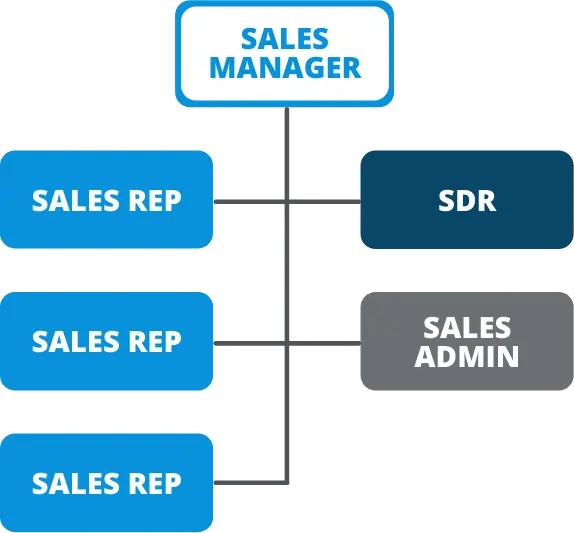
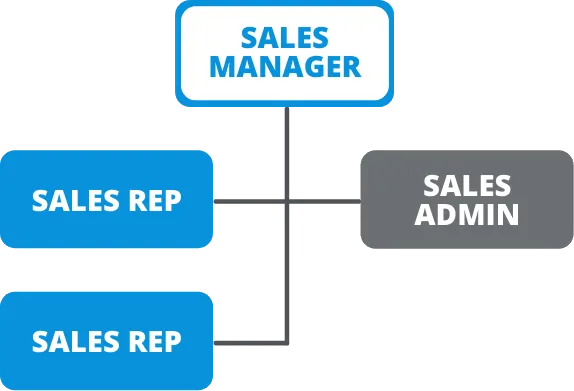
The thing is, the order that you approach things matters a lot. Start with the right sales strategy and irresistible offers. Then get the basic systems and numbers.
Then you’ll be set up with the clarity and foundation to then build your sales team, one key piece at a time.
MASTERING THE NUMBERS
Mastering your key metrics is a fundamental 2X principle (it’s even a core value of ours!) because the numbers are fact.
They take out the guesswork and show you what’s working, what’s not, where to focus, and what to fix. Plus, they help you get your team clear and aligned, show them how they’re doing, hold them accountable, and give you one of the most powerful tools to grow your business.
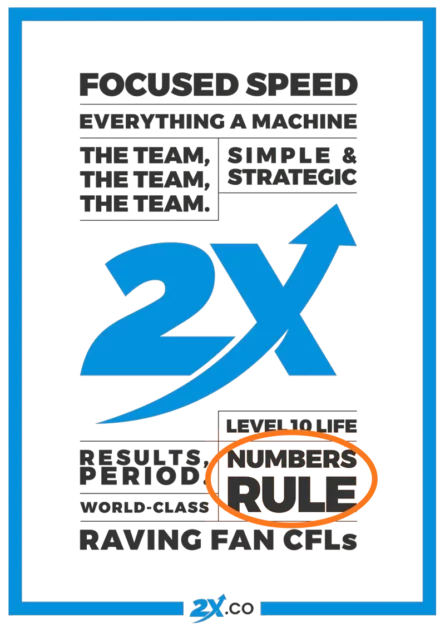

So which numbers specifically do you need to track?
It starts by aligning the most important metric for each step of your sales value chain.
(You can see a more detailed video on this game-changing theory of the value chain here.)
The value of this is in being able to see the 30,000-foot view and identify exactly where to focus.
Most entrepreneurs will think they have a sales problem, but where do you focus? What do you fix? Most don’t know!
So, going more specific with the steps will help you pinpoint exactly where the bottleneck is.
Now, using your sales value chain as your guide, map out the prospect journey in the form of the key metrics from one step to the next, starting with the goal of your pre-call step: to get them to show up!
Here’s an example of your key sales metrics to track:

- Show-Up Rate
- Close Ratio (of Show Ups)
- Number Of Sales
- AOV (Average Order Value) — Money Received Now
- Total Sale Value — Total Value Of Sale If Fully Completed
And a bonus metric would be how long it took to close (time to sale). But as always, keep things simple to start.
By breaking things out… and then tracking your conversions for each step, you can build much more consistency AND fix the problem directly.
For each step, you’ll want to ideally track the metrics for: the actual, target goal, minimum baseline, and recent average (we often do 30 days).

This way you’ll see the trends and also quickly be able to spot where the weak links are.
Then address the specific bottlenecks one at a time (which are way easier to improve than the entire system) and voila: more sales and better conversions!
Working with hundreds of 6 and 7-figure companies at 2X, we have seen the profound impact by doing this over and over. Ryan Rockwell came into the 2X Accelerator with some great sales skills and strong business. The bad thing is, he didn’t know his numbers at all—so he was working hard trying to solve the wrong things. He said, “When I started with 2X, I didn’t even know what KPI meant.”
While in the Accelerator, by first going deep into his numbers and improving his sales department to be a machine, he grew from $31k per month… to over $307k per month!
He added, “Now we have literally dialed in so much on every single part of our business that we know exactly how to scale every step of the way. The future has never been brighter for us.”
So, long story short, if you want to fix your business and optimize each department (especially sales)…
Break things into a value chain series of steps, get clear on the numbers, and keep building the machine one step at a time.
The rest becomes easy from there.
Your Sales Dashboard
As you continue to build out your machine, the numbers will be at the heart of your entire sales department. So, you’ll want to have a sales dashboard that tracks and summarizes the key data.
Here are a few things to keep in mind as you build this out:
- Keep it simple: if it’s complex or not clear, it will soon not be used. Start wildly simple. Then slowly get a little more sophisticated. But simple scales!
- Start with a spreadsheet: you can try all of the tech in the world, but keep things simple. Get the right numbers being tracked. Get in flow. Then you can get as complex as you want, but there’s no better place to start than a spreadsheet. We still to this day use sheets!
- Make it a culture thing: don’t just use the numbers every once in a while. Make them a daily part of your team, meetings, and culture. Get everyone familiar with what the metrics are, why they matter, and how they’re all held accountable.

- The flow of data to identify where the bottleneck is in different timeframes
- And also over time, to spot trends
It gets everyone aligned on what matters and then can be broken down by sales rep too… ultimately giving you, and your sales team, great power, and clarity by knowing your numbers.
A huge shift happens as soon as you master this in your business. It’s one that most businesses struggle with, but in 2X, we make sure it’s a strength for you.
PUTTING IT ALL TOGETHER


- Systems are the secret! Build out each step of your entire sales system, one small piece at a time. You’ll have more consistency, control, and better results… while being able to remove you from sales!
- The numbers are your guide. They take out the guesswork, help you drive accountability and results. So use them wisely!
- Sales strategy and flow: see the 30,000-foot view and micro-steps to be able to know where exactly to focus!
- Make your life easier with an irresistible offer: work with marketing and leadership to help craft truly irresistible offers. With the proper feedback and teamwork, you can craft the right offers… which makes your sales team look like heroes.
- Get everyone aligned on the right metrics: It’s not just about sales conversions. It’s about total revenue (and profit) and driving long-term relationships. Take into account everything from the follow-up to creating raving fans, driving referrals, and keep nurturing clients for the long-term.. and you’ll have a world-class sales team.
To put this all together and start to build your sales machine, begin with these three steps:
Action #1: Map out your sales ‘value chain’ steps that are ideal based on your sales strategy and offer. What is the exact process for you?
Action #2: Get clear on your metrics for each step. Where are you at now, what should your ideal numbers and conversions be? This will be your sales success formula.
We will help guide you on this in our free deep-dive KPI Guide here.
Action #3: Create or improve your sales script to begin optimizing this with feedback over the coming days/weeks. Soon you’ll be driving much more consistency, better conversions, AND be able to duplicate your sales team without reliance on you or any one rockstar sales rep.
Remember: Systems are the secret!
To help guide you on this step-by-step, we’ve put together a full Masterclass on how to turn your business into a MACHINE.
This will show you our proven Machine Methodology that we use with our private 2X Accelerator clients to help them drive consistent, controllable growth.
Inside the Systems Masterclass, you’ll find:
- The proven path to a $1M per year and $5M per year business
- How to use systems, numbers, and your team to build a Machine that runs without you
- How to fire yourself from the day-to-day operations and stop feeling owned by your business!
- The key levers to drive controlled growth
- And the strategic order that matters, setting you up to get more traction in less time

The Playbook To 7+ Figures
This has been called “the business Bible for 6-figure entrepreneurs”… now you can get it with exclusive bonuses for a crazy low price!
Related Articles